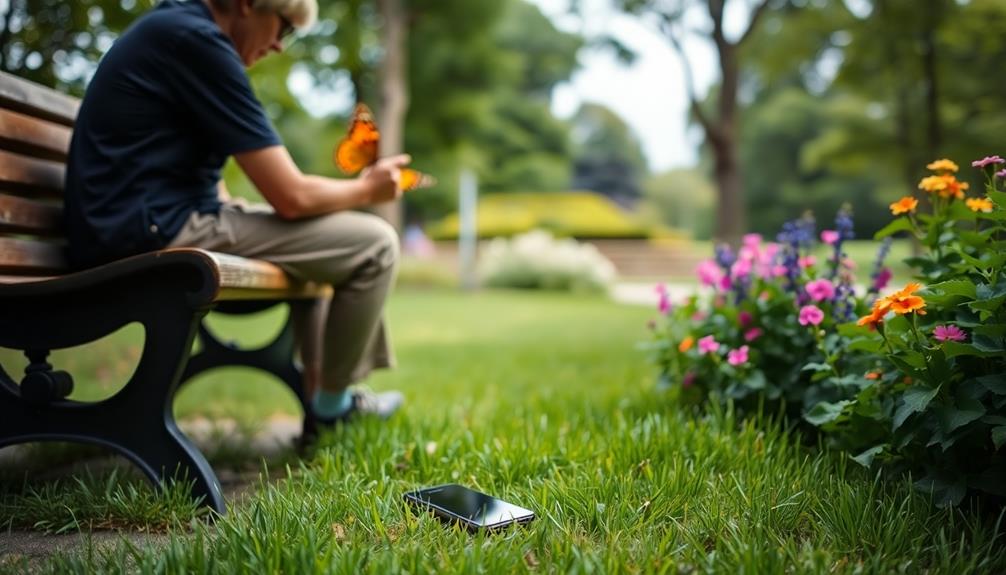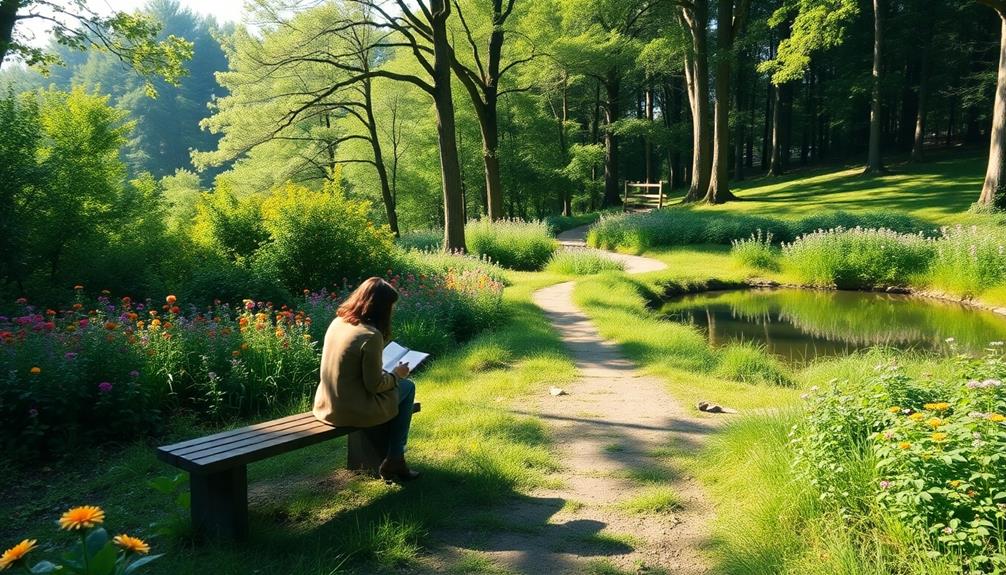To cultivate curiosity in your daily routine, start by powering up your passions; engage deeply in what excites you. Ask open-ended questions to spark deeper conversations and understanding. Teach others while learning from them, as this mutual exchange enhances retention. Don't shy away from exploring your surroundings—try new routes during walks. Embrace diverse opinions to broaden your perspective. Unplug from tech regularly to create mental space, and challenge yourself to get uncomfortable. Finally, reflect on your experiences to encourage growth. Stick around, and you'll discover even more ways to ignite your curiosity.
Key Takeaways
- Incorporate open-ended questions into daily conversations to spark deeper dialogue and enhance understanding of others' perspectives.
- Engage in new activities regularly to embrace discomfort and expand your capabilities, igniting curiosity.
- Explore local environments by changing your routine routes to discover hidden gems and connect with your surroundings.
- Participate in community events to strengthen connections and learn about local culture, enriching your daily experiences.
- Set aside time for self-reflection through journaling to gain insights about your interests, behaviors, and motivations.
Power Up Your Passion

Your passions can be powerful catalysts for curiosity and learning. When you identify what truly excites you, you'll find that learning becomes a more enjoyable experience. Engaging in your favorite activities—be it reading, hiking, or exploring specific subjects—sparks curiosity and keeps your interest alive.
This is the essence of passion-driven learning, where your enthusiasm leads you to explore deeper into the topics you love. Additionally, cultivating an abundance mindset can enhance your ability to discover new interests and avenues of knowledge, allowing you to embrace a sense of well-being and happiness as you pursue your passions.
By incorporating your passions into your daily routine, you can turn mundane tasks into exciting opportunities for exploration. Whether it's setting aside time to read about a favorite subject or planning a hike in a new area, these activities can greatly enhance your learning journey.
Research shows that when you actively pursue your passions, you boost your motivation and resilience, as they provide a sense of purpose.
Ask Awesome Questions

To spark engaging conversations, focus on asking open-ended questions like, "What inspired you to pursue that path?"
These inquiries not only encourage deeper dialogue but also help you understand the motivations behind people's actions. By probing "why," you can enhance your critical thinking and strengthen connections with others.
Engaging with curiosity can lead to greater fulfillment and a more satisfying social life, as it opens doors to diverse perspectives and innovative ideas.
Open-Ended Inquiries
Throughout your day, asking open-ended questions can spark engaging conversations that enrich your interactions. When you pose inquiries like "What do you think about…?" or "How did you come to that conclusion?", you encourage deeper discussions and foster a culture of curiosity. These types of questions invite nuanced responses, allowing for a more profound exchange of ideas.
Incorporating open-ended inquiries into your conversations promotes critical thinking. Rather than settling for simple yes or no answers, you challenge yourself and others to articulate thoughts and feelings. This practice transforms mundane interactions into meaningful dialogues, whether in personal or professional settings.
Moreover, open-ended questions enhance your listening skills. By focusing on the speaker's perspective, you cultivate a more attentive and empathetic approach to communication. As you engage in these richer conversations, you'll likely discover unexpected learning opportunities that contribute to personal growth.
Ultimately, embracing open-ended inquiries can deepen your connections with others, leading to more enriching relationships. So, make it a point to ask awesome questions and watch how these conversations unfold, helping you cultivate curiosity in your daily routine.
Probing "Why" Questions
Incorporating open-ended inquiries into your conversations sets the stage for deeper exploration, particularly through probing "why" questions. These questions not only foster critical analysis but also encourage you to learn something new about the world around you.
By digging deeper, you can uncover assumptions and biases, leading to a more informed and open-minded perspective. Engaging in activities that promote curiosity, such as watching shows like *Young Sheldon* that incorporate scientific concepts, can also inspire more "why" questions and discussions.
Additionally, using tools like interactive quizzes can create a collaborative environment that enhances inquiry-based learning.
Here are four ways probing "why" questions can enrich your interactions:
- Enhance Creativity: "Why" questions push you to explore alternative solutions and viewpoints, facilitating innovative problem-solving.
- Strengthen Relationships: They show genuine interest in others' thoughts and motivations, enhancing emotional connections and trust.
- Cultivate Curiosity: Regularly asking "why" nurtures a habit of curiosity, making exploration a natural part of your daily routine.
- Spark a Sense of Wonder: Each question can lead you down new paths of understanding, igniting your imagination and appreciation for the complexities of life.
Teach and Be Taught

When you share your knowledge, you not only reinforce what you know but also create opportunities for mutual growth.
Engaging with others through collaborative learning experiences can spark creativity and innovation.
Knowledge Sharing Dynamics
Curiosity thrives in an environment where knowledge flows freely between individuals, transforming the act of teaching into a powerful tool for personal growth.
Engaging in knowledge sharing not only allows you to impart your understanding but also opens the door to learning from others. This reciprocal exchange deepens your comprehension and retention of information, creating a richer learning experience.
Here are four ways knowledge sharing dynamics can enhance your curiosity:
- Organize Your Thoughts: Teaching forces you to articulate and structure your knowledge, reinforcing what you know.
- Encourage Diverse Perspectives: Learning from others introduces new ideas, sparking creativity and innovation.
- Build Relationships: Sharing memories and passions fosters connections, nurturing a supportive environment that promotes exploration.
- Create a Sense of Community: Collaborative knowledge sharing enhances personal growth and cultivates belonging among participants.
Collaborative Learning Experiences
Knowledge sharing dynamics set the stage for collaborative learning experiences, where the act of teaching and being taught intertwines seamlessly.
When you engage in peer teaching, you enhance your understanding and retention of knowledge. Explaining concepts in your own words helps reinforce your learning, making it stick longer.
Participating in group projects or study sessions not only promotes teamwork but also exposes you to diverse problem-solving techniques and creative ideas.
You'll find that discussing personal passions and memories with others fosters deeper connections and enriches the learning experience for everyone involved.
Research shows that teaching others can lead to a remarkable 90% retention rate of information, emphasizing the power of the "learn by teaching" approach.
In these collaborative learning experiences, open dialogue and curiosity thrive, allowing you to ask questions and explore topics more deeply.
As you immerse yourself in these environments, you not only gain knowledge but also cultivate a passion for learning.
Embrace these opportunities to teach and be taught, and you'll find that curiosity becomes a natural part of your daily routine.
Mutual Growth Opportunities
Engaging in mutual growth opportunities transforms the learning experience into a dynamic exchange where everyone benefits. When you teach others, it reinforces your understanding and creates an environment ripe for curiosity and exploration.
To cultivate this spirit in your daily routine, consider these strategies:
- Participate in Knowledge-Sharing Sessions: Join or organize gatherings with peers to discuss diverse perspectives and experiences.
- Engage in Community Workshops: Attend workshops or group discussions to expose yourself to innovative practices and fresh ideas.
- Seek Mentorship Opportunities: Connect with a mentor or become one yourself; this reciprocal relationship allows for valuable insights and shared growth.
- Collaborate on Projects: Work on team projects that require each member to teach and learn from one another, leading to unexpected discoveries.
Don't hesitate to ask someone about their expertise or experiences. You never know when you might learn a new skill or gain a fresh perspective.
Connect the Dots

In your daily pursuits, connecting the dots between different skills and ideas can spark remarkable insights. By recognizing transferable skills, you can enhance your overall competence.
Think about how abilities you've honed in one area might apply in another, leading to innovative solutions. Curiosity drives you to explore these connections, revealing unexpected parallels between seemingly unrelated fields.
Making analogies is a powerful tool. When you draw from diverse disciplines, you can inspire new insights that foster creative thinking and improve your problem-solving capabilities.
Mastering fundamental skills in one domain often aids in understanding and applying those same skills elsewhere, which creates a more versatile skill set.
Moreover, identifying best practices from various fields can inform and enhance your primary focus. Engage in cross-disciplinary thinking, and nurture your curiosity.
As you connect ideas, you'll enrich your understanding and creativity. Embrace the challenge of linking concepts, and watch as your innovative spirit flourishes.
Each dot you connect brings you closer to a broader perspective, making your daily experiences more enriching and insightful. Keep curiosity at the forefront, and let it guide your journey of discovery.
Walk It Out

Taking a walk can be one of the simplest yet most effective ways to cultivate curiosity. When you step outside and walk it out, you stimulate your brain function and creativity, enhancing your cognitive abilities.
Engaging with nature not only promotes mental clarity but also reduces stress, inspiring new ideas through sensory experiences. To make the most of your walks, consider these four tips:
- Explore New Routes: Change your usual path to discover hidden gems in your neighborhood. This can spark curiosity about your surroundings.
- Embrace Nature: Walk in parks or natural settings to enhance your connection with the environment, which can lead to fresh insights.
- Walk with Others: Invite friends or family along. Conversations can inspire curiosity and shared learning.
- Try New Things: Mix up your walking routine—try walking at different times of the day or incorporating mindfulness practices to deepen your experience.
Get Uncomfortable

Getting uncomfortable isn't just about stepping out of your comfort zone; it's a pathway to profound personal growth. When you choose to get uncomfortable, you're embracing discomfort in ways that foster resilience and adaptability. This isn't merely a challenge; it's an opportunity for exploration and learning.
Trying new activities, like taking a dance class or hiking a new trail, expands your capabilities and ignites your curiosity. These experiences push you to think creatively and solve problems in innovative ways. You might face fears, such as public speaking or traveling alone, but conquering these challenges can greatly boost your confidence and sense of accomplishment.
As you embrace discomfort, you develop a mindset geared toward continuous learning. Each challenge becomes an opportunity for self-improvement, allowing you to navigate life's complexities with greater ease.
The more you engage with unfamiliar situations, the more you enhance your adaptability, setting a foundation for ongoing personal growth. So, step into the unknown, and let your curiosity lead the way. Embrace the discomfort; it's where the real magic of growth begins.
Embrace Thine Enemy

To truly embrace thine enemy, you need to understand opposing perspectives, which can sharpen your critical thinking skills.
When you engage with contrasting beliefs, you not only strengthen your personal convictions but also foster open-minded discussions that can lead to innovative solutions.
Understand Opposing Perspectives
Exploring opposing perspectives can be a powerful tool for personal growth and understanding. When you actively engage with viewpoints that differ from your own, you challenge your beliefs and expand your understanding of complex issues.
This practice not only fosters empathy but also encourages open-mindedness, making you more receptive to new ideas. Here are a few ways to embrace this approach:
- Seek Out Diverse Opinions: Actively look for articles, podcasts, or discussions that present alternative viewpoints.
- Practice Argument Construction: Try to articulate and defend a position you don't necessarily agree with. This enhances your critical thinking skills.
- Engage in Conversations: Discuss contentious topics with friends or family who hold opposing views. Listen actively and ask questions.
- Reflect on Insights: After engaging with different perspectives, take time to reflect on what you've learned and how it challenges your own beliefs.
Strengthen Personal Convictions
Strengthening your personal convictions often means facing off against opposing viewpoints rather than shying away from them. Embracing these challenges can greatly enhance your critical thinking skills. When you explore contrary beliefs, you're not just defending your stance; you're also cultivating curiosity. This process forces you to contemplate alternative perspectives, which can prompt personal growth.
By constructing arguments for opposing views, you develop empathy and sharpen your ability to articulate your beliefs. Engaging with diverse opinions encourages open-mindedness, leading to a more nuanced understanding of complex issues. This practice doesn't just bolster your arguments; it makes you a more effective communicator and thinker in discussions.
Moreover, diving into different perspectives can uncover biases in your own thinking, helping you connect more deeply with your convictions. You'll find that challenging your own views enriches your understanding and strengthens your resolve.
Foster Open-Minded Discussions
Open-minded discussions are the battleground where ideas clash and understanding flourishes. When you engage with individuals who hold opposing viewpoints, you sharpen your critical thinking skills and deepen your grasp of complex issues.
Embracing diverse perspectives cultivates curiosity and fosters empathy, allowing you to explore multiple sides of a topic.
Here are four ways to foster open-minded discussions:
- Seek Out Opposition: Intentionally engage with those who disagree with you. This expands your understanding and challenges your views.
- Ask Questions: Be genuinely curious. Inquire about the reasoning behind their beliefs to gain insights you mightn't have considered.
- Articulate Counterarguments: Practice constructing arguments for opposing beliefs. This not only enhances your empathy but also strengthens your ability to defend your convictions.
- Celebrate Diversity: Embrace the variety of opinions. Recognizing and appreciating different perspectives can lead to innovative solutions and a more rounded worldview.
Tech Time-Out

In today's fast-paced digital world, taking a tech time-out can feel revolutionary. When you unplug, you create a safe space to explore the world around you. This first step can help you learn to engage with your thoughts more deeply, free from constant notifications.
The good news is that offline activities like reading, journaling, or pursuing creative hobbies can spark your naturally curious side.
Every day, you have the opportunity to ask one question that leads to new discoveries. You might never know what you'll find in your backyard or a nearby park until you take the time to explore. Spending time in nature not only enhances mental clarity but also fosters a more open mindset, allowing you to connect with both your surroundings and new people.
Regularly scheduling tech-free time boosts your well-being and life satisfaction. It creates space for reflection and helps you pursue interests outside the digital landscape.
Explore Your Environment

When you venture beyond your usual paths, you might be surprised by what you discover right in your own backyard.
Exploring your local environment can reveal hidden gems that enrich your daily life. Studies show that 70% of people find new spots in their neighborhoods when they take a different route.
Here are some ways to make the most of your exploration:
- Visit Local Events: Check out farmers' markets, art shows, or community festivals to engage with your neighbors and build connections.
- Discover Nature: Even in urban settings, spending time outdoors can reduce stress and boost creativity—take a walk in a nearby park or garden.
- Learn Local History: Research historical landmarks and learn about your community's past to deepen your appreciation of where you live.
- Try New Routes: Change your daily commute or walk a different trail to stimulate curiosity and encourage personal growth.
Reflect on Your Journey

Reflecting on your journey can lead to profound insights that enhance your understanding of yourself. By taking the time to evaluate your experiences, you can uncover patterns in your behavior and thought processes. This deeper self-awareness helps inform your future curiosity-driven pursuits.
Consider keeping a journal to document your experiences and insights. Writing regularly allows you to internalize your learning, making it easier to spot areas of interest and curiosity. Setting specific learning goals and reviewing your progress can help maintain motivation and cultivate a habit of exploration in your daily routine.
Deliberate contemplation of past choices fosters personal growth. Reflecting on how your experiences have shaped you can inspire new questions and open up fresh avenues for curiosity. Engaging in this reflective practice not only aids your self-understanding but also promotes a mindset ready for future learning and exploration.
Ultimately, as you reflect on your journey, you enrich your daily interactions and experiences. By embracing this process, you'll find that curiosity becomes a natural part of your life, leading to continuous growth and discovery.
Frequently Asked Questions
How Do You Cultivate Curiosity?
To cultivate curiosity, you can start by asking yourself questions that spark your interest.
Make it a habit to jot down these questions in a journal. Engage in conversations that encourage open-ended discussions, allowing you to explore different perspectives.
Set aside time weekly to learn something new, whether that's a skill or a topic.
How Is Curiosity Used in Everyday Life?
Curiosity shows up in your everyday life when you ask questions and seek to understand the world around you. It drives you to try new foods or learn new skills, sparking excitement and expanding your knowledge.
Engaging with diverse people enriches your conversations and broadens your perspective. Reflecting through journaling helps you explore your thoughts and feelings, leading to self-discovery.
Embracing curiosity ultimately enhances your relationships and overall well-being.
How to Develop Skills for Curiosity?
Imagine curiosity as a garden, waiting for your attention.
To develop skills for curiosity, you've got to plant seeds of wonder. Start by asking questions, as if each inquiry is a raindrop nourishing your garden. Engage in conversations, listening actively, and inviting deeper thoughts.
Explore new topics weekly, like discovering different flowers. Let your mind wander; it's sunlight for your curiosity.
With patience and practice, your garden will bloom, revealing vibrant ideas and insights.
How to Cultivate Curiosity in Kids?
To cultivate curiosity in kids, encourage them to ask questions and explore their interests.
Create a stimulating environment filled with diverse books and art supplies.
Take them on outings like museum visits or nature walks, letting them observe and engage.
Establish a routine where you discuss their daily experiences, prompting reflection.
Conclusion
By weaving curiosity into your daily routine, you ignite a spark that lights up your mind like a thousand stars in the night sky. Each question you ask and every new experience you embrace builds a tapestry of knowledge and wonder. So, don't just go through the motions—dance through them! Keep exploring, learning, and connecting the dots. With each step, you'll discover a world bursting with possibilities, waiting just for you to uncover its treasures.









